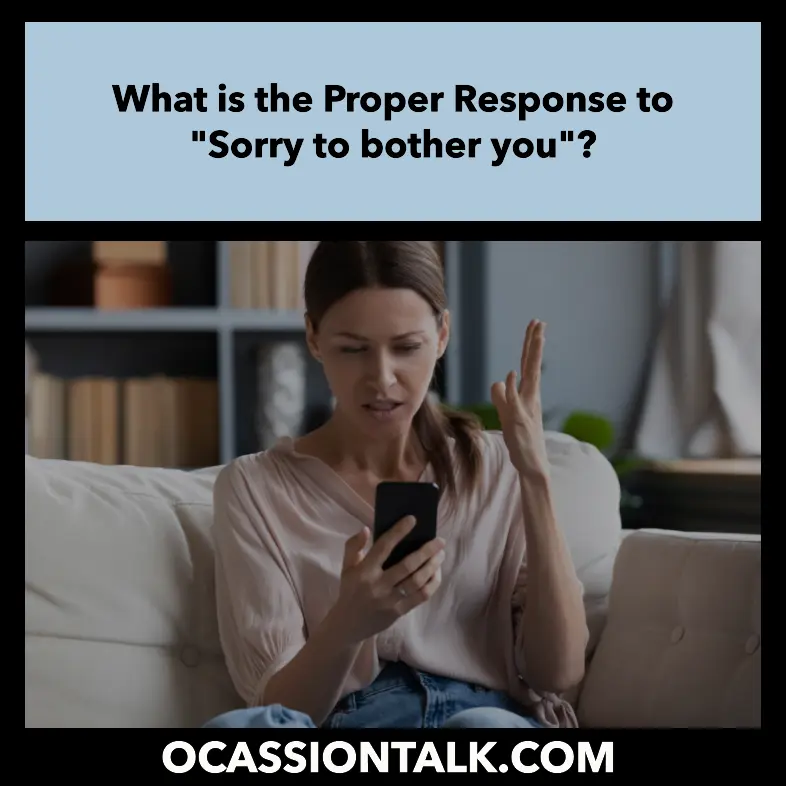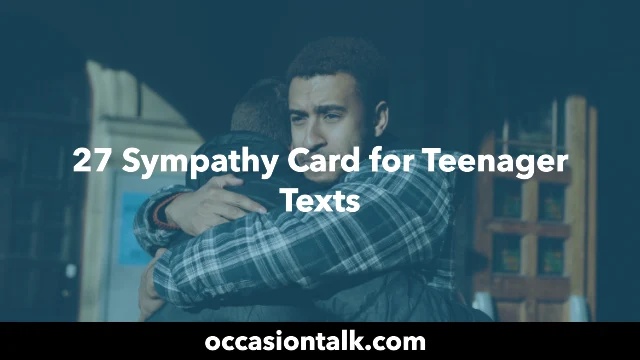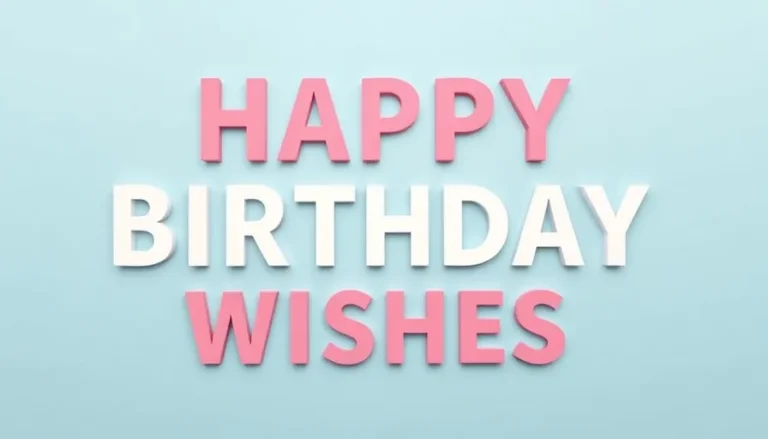30 Best Responses to “Sorry to Bother You” For Every Situation
When someone says “Sorry to bother you,” it can sometimes leave you at a loss for words.
You may not want to brush them off, but you also don’t want to seem overly affected by their interruption.
Finding the right response can make all the difference in maintaining a positive and respectful interaction.
In this article, we’ll provide you with 30 responses for various scenarios when someone says “Sorry to bother you,” so you can handle these situations with grace and ease.
What is the Proper Response to “Sorry to bother you”?

The proper response to the statement “Sorry to bother you” largely depends on the context and your personal feelings toward the situation.
Understanding the different backgrounds can help navigate the appropriate response.
In general, if the person is not bothering you or someone you care about, and you can easily get over the inconvenience without any consequences, a polite response would be “You are not bothering me.” This reassures the person that their actions are not causing any inconvenience or disruption.
On the other hand, if the person is actually causing a bother but you want to maintain a friendly disposition, a response such as “No problem” can be used.
This acknowledges their apology while indicating that it’s not causing any significant inconvenience.
In cases where the person is genuinely bothering you and you would prefer not to be friendly, a response like “I’m pretty busy at the moment, could you come later?” can help communicate your current unavailability without outright dismissing them.
If the person is a consistent bother and you no longer want to entertain their requests, it is acceptable to politely decline with a straightforward response like “No, sorry, I can’t now.” This sets a boundary and makes it clear that their frequent requests are no longer tolerable.
It is important to note that while some people apologize for bothering you as a courtesy, others may genuinely feel remorse after realizing that they inconvenienced you.
In such cases, a sincere apology deserves an understanding and genuine response.
Responding with a kind remark like “No worries” or “It is no bother” can help reassure them that their apology is accepted and that there are no hard feelings.
The key is to assess the situation and respond accordingly, considering your boundaries, relationship with the person, and your level of inconvenience.
How to Respond When Someone Says Sorry to Bother You

#1 Sorry To Bother You Responses In a Professional Setting
- No problem at all, how can I assist you? – Show your willingness to help and provide the necessary support.
- It’s not a bother, I’m here to help. What do you need? – Assure the person that their request is important to you and that you’re available to assist.
- Don’t worry, you’re not bothering me. What can I do for you? – Reassure them that they are not causing any inconvenience and that you’re ready to assist them.
- Not a bother at all, I’m happy to help. What’s on your mind? – Express your willingness to assist and encourage open communication.
- No need to apologize, I’m here to support you. How can I be of service? – Show empathy and offer your assistance without any hesitation.
#2 Sorry To Bother You Responses In a Personal Setting
- You’re not bothering me at all. What can I do for you? – Assure the person that their presence or request is welcomed.
- Don’t apologize, I’m always here for you. How can I help? – Reaffirm your availability and express your willingness to provide assistance.
- No need to apologize. I’m glad you reached out. How can I assist you? – Show gratitude for their communication and offer your support.
- You’re not a bother, I’m happy to talk with you. What’s on your mind? – Let them know that you’re open to listening and that their thoughts or concerns are important to you.
- Apologies are not needed. I’m here to support you. How can I be of help? – Reassure them that there’s no need to apologize and express your availability to assist them.
#3 Sorry To Bother You Responses When You’re Busy
- I’m in the middle of something, but I can spare a few moments. What’s up? – Acknowledge your current workload, but still make time to address their concerns.
- I appreciate your understanding. Can we discuss this in a few minutes when I’m available? – Request a time when you can give them your undivided attention.
- I’m quite busy at the moment, but I’d be happy to help you later. Can we schedule a time? – Show your willingness to assist, but suggest finding a time that suits both parties.
- I’m swamped right now, but I don’t want to dismiss you. Can we reconvene at [specific time]? – Propose a specific time when you’ll be able to give them your full attention.
- I have a tight deadline, but I can spare a moment. How can I assist you quickly? – Acknowledge your busy schedule while still offering a small window of time for their request.
#4 Sorry To Bother You Responses When You’re in a Rush
- I’m running late, but I want to hear you out. Can you give me a brief version? – Indicate your time constraints, but show your interest in hearing them out briefly.
- I apologize, but I only have a minute. How can I help you quickly? – Express your limited availability but still offer assistance in the limited time you have.
- I’m sorry, but I’m on a tight schedule. Can we discuss this later? – Communicate your current time limitations and suggest rescheduling for a more convenient time.
- I’m in a rush right now, yet I want to address your concern. Can we set up a call later? – Acknowledge your lack of time and propose a call to provide them with your undivided attention.
- I’d love to help, but I’m pressed for time. Can we chat about it tomorrow? – Express your willingness to lend an ear in the near future while highlighting your current time constraints.
#5 Sorry To Bother You Responses When You’re Occupied with Prior Commitments
- My schedule is quite packed, but I can dedicate some time to discuss it later. – Mention your busy schedule but assure them that you’ll make time to address their concern.
- I’m engaged in something right now, but I want to be there for you. Can we talk soon? – Indicate your current engagement and express a desire to communicate at a more suitable time.
- I’ll be available in [specific timeframe]. Can we connect then? – Offer a specific timeframe when you’ll be able to give them ample attention.
- I’d like to hear you out, but I have a commitment at the moment. Can we meet later today? – Express your interest in listening to them and propose rescheduling for later when you’re available.
- I can’t give you my full attention right now, but I’m free in [specific timeframe]. Can we chat then? – Let them know you’re occupied and suggest a specific timeframe when you can attend to their needs.
- I’m currently tied up, but I’ll get back to you as soon as I can. – Acknowledge your unavailability and assure them that you’ll follow up at the earliest opportunity.
- I’m sorry, but I’m not available right now. Can I reach out to you later? – Apologize for your current unavailability and offer to contact them at a more suitable time.
- I won’t be able to assist you at the moment. Can we discuss this tomorrow? – Inform them of your unavailability and propose a suitable alternative time for a discussion.
- I’m afraid I can’t help you right now, but let’s reconnect in a couple of hours. – Express your inability to assist immediately but suggest reconnecting at a later time.
- I’m currently occupied, but I’ll find someone who can help you with that. – Let them know that you are unable to assist personally but assure them that you’ll find another suitable contact who can.
Tips to Deal With “Sorry to Bother You” Situation
- Respond with kindness and reassurance: Instead of dismissing their apology, respond with kindness and reassurance. Let them know that they’re not bothering you and that you’re happy to help or listen to them.
- Express appreciation: Show gratitude for their consideration by acknowledging their apology. This helps put them at ease and shows that you value their thoughtfulness.
- Assure them that you’re available: Reassure the person that you’re open and available to talk or assist them. Let them know that they can reach out to you whenever they need to, without any hesitation or worry about bothering you.
- Listen actively: If the person has a concern or something they want to discuss, give them your full attention and listen actively. Show genuine interest and engage in the conversation, letting them know that you’re there to support them.
- Offer help or guidance: If appropriate, offer assistance or guidance to address their concern or issue. Whether it’s offering advice, providing resources, or simply lending a listening ear, find ways to be helpful and supportive.
- Maintain boundaries if needed: While it’s important to be kind and available, it’s also essential to set boundaries if you’re unable to help or if the person’s request is not within your capabilities. Communicate this in a polite and respectful manner, while offering alternative solutions or suggestions if possible.
- Follow up and check in: After the initial conversation, follow up with the person to see how they’re doing or if they need any further assistance. This shows that you genuinely care and are willing to support them.
Final Thoughts
Remember, the key is to respond with empathy, kindness, and understanding when someone says “Sorry to bother you.”
Consider the context and choose the response that aligns best with the situation.
By doing so, you’ll communicate your willingness to help without dismissing their concerns.






